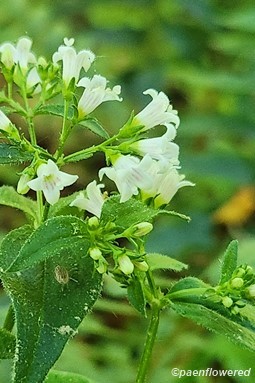Houstonia purpurea
Houstonia purpurea large bluet
Large bluet is a herbaceous perennial in the coffee family. It is considered rare in Pennsylvania, with documented presence only in Fayette, Somerset, Bedford, Lancaster, and Berks Counties. Rare in other states as well, large bluet is native to the eastern and central United States, from Nebraska northeast to Maine and south to Florida and Texas, with sightings being treasured by wildflower enthusiasts.
Found in open woods, rocky slopes and along roadsides, this low-growing, 6-16”, multi-branched plant shows off tiny ¼” lavender-blue to white clusters of long, tubular flowers at the end of angled, hairy stems.
Leaves are with smooth margins (entire), opposite, sessile, and typically 1–3 inches long. They are ovate to lanceolate in shape, often three-veined with basal leaves typically broader than cauline. While basal leaves may appear early in the plant’s life cycle, they are often absent during flowering and may re-emerge after bloom.
Appearing year after year thanks to its ability to self-seed, the large bluet prefers sun to partial shade and well-drained soil, and will spread if left undisturbed. Blooming for about a month, usually in late spring to mid summer, it attracts bees, butterflies, skippers, and bumble bees with its nectar-rich, tubular flowers. Snails and slugs browse on the foliage and may devour tender seedlings.
Habitat & Range
Very rare in open woods, rocky slopes and along roadsides. Prefers full sun to partial shade with well drained soil.
Present in Fayette, Somerset, Beford, Lancaster & Berks Cos.
Range: Native to Central and Eastern United States ranging from Nebraska northeast to Maine and south to Florida and Texas
Wetland code: Not classified
Phenology
Flowers May to early August. Blooming period is 4 weeks.
Characteristics
Inflorescence few- to many-flowerd cymes; heterostylous; center flower usually opens first
Flowers corolla lavender-blue to white, with a fine to noticeably fuzzy inner surface; 4 petals fused into into a tubular or cup shape; ¼″ across
Leaves simple, opposite, ovate, entire, sessile; pubescent to glabrous, 3-7 veined; 1-3″ long
Stems erect or ascending, branching from upper nodes; pubescent, angled, green to purplish
Rhizomes slender, fibrous
Fruit dehiscent capsule, spherical to slightly elongated; contains several seeds
Height 6 to 16 inches
Plant Codes
PA status: PT (Threatened)
S-rank: S1 (Critically imperiled)
G-rank: G5 (Secure)
Ecology
Bumble bees, flies, bees, skippers, and beetles come for pollen and nectar. Snails and slugs chew holes in leaves flowers and fruits and can devour seedlings.

.jpg?v=638486559850000000)


Comments
Have you spotted this plant in your area? We'd love to hear about your experience! Share your comments or questions about the plant below. Comments are moderated before posting.